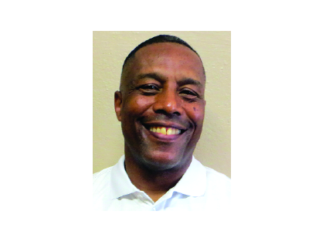
ENGLEWOOD, N.J.—Joanne English Rollieson is currently the head of English Realty Associates, one of the first black-owned real estate offices in Bergen County.
English Rollieson attended Rutgers University before getting her real estate license. Her father, the late Whittie English, started the family enterprise over 65 years ago. The company motto is, “We Buy, We Build, We Sell. Over 60 years in the business; we must be doing something right.”
Serving as president and CEO, she works alongside her husband, Ronald English Rollieson, director of sales and marketing, and her son, Marco Gaskin, vice president.
During her 35 years at English Realty she has tapped into the celebrity and sports market, and has been quite successful in making the entertainment industry her niche. Some of her clients include Mary J. Blige, Alicia Keys, Lil’ Kim, Angie Stone, Al Sharpton, Fabolous, and Kenny Anderson.
English Rollieson manages the real estate office, which is open seven days a week, overseeing her staff of both full- and part-time agents.
In her personal life, she has been involved with many community and charitable organizations, including serving on the board of trustees at Englewood Hospital and Medical Center (Englewood Health) and acting as commissioner and treasurer of the Bergen County Housing Authority. She is also a notary public, co-chair of the Cultural Outreach Department of the cancer-support organization Gilda’s Club of Northern New Jersey, and founder of the “Spring Bling Think Pink” Breast Cancer Fundraiser.
In recognition of English Rollieson’s community service and exceptional leadership skills, in January 2013 she received the Spirit of King Award (named in honor of Dr. Martin Luther King Jr.) from Pastor Vernon Walton on behalf of the Mount Calvary Baptist Church.
She is also an advocate for cancer awareness, and in 2012 she received the Health Award from former Teaneck Mayor Lizette Parker during her fourth annual Black History Month program, which celebrates African-Americans making a difference in the community.
English Rollieson has herself battled and overcome life-threatening illnesses and many obstacles, yet she remains a dedicated community leader and outstanding businesswoman who is determined to continue her family legacy.
• • •
Hillary Viders: Your father is recognized as a pioneer in realty and was the first broker to sell houses to African American families in Englewood.
Joanne English Rollieson: In 1953, when he opened English Realty, he was the only African American broker in all of Bergen County. My father’s father was a builder and he was instrumental in this. My father was first a builder and he helped his father construct a lot of the properties that were here in Englewood.
My father then decided to get his real estate license to sell these properties. As an African American, he felt it necessary to help other African Americans purchase homes by any means necessary. So, for those that couldn’t qualify, he actually lent them the money or did creative financing with wraparound mortgages.
HV: What was the reaction of neighboring homeowners?
JER: There was a very positive reaction from the African American community. But, amongst non-African Americans, there was a lot of contention.
As an African American, he was not allowed to have a multiple listing. No one would list his properties and they would not allow him to show their properties. So, he was instrumental in being a part of an organization called the Realtist, which began in the south. He started his own multiple listing service that supported democracy and allowed other African American brokers to list their properties. My father had offices in Englewood, in Newark and in Paterson.
HV: Over the last decade, the real estate market has faced many challenges. Traditionally, buying real estate was always considered to be a solid investment, one that was sure to increase in value. When and why did that change?
JER: In my life, it has never changed. I was always taught to buy real estate. When I was 19 years old, I bought my first house right here on First Street in Englewood for $50,000. I sold it a year later for $120,000.
After the inflated prices and the crash in the late 1990s and early 2000s, the market went through a correction. Whatever comes up goes down and whatever goes down comes up. So that was a cycle, and now it’s coming back up, maybe not as rapidly or to the booming levels that it was before, because that was built on false money. There are controls now that don’t allow people to take second and third mortgages that they can’t afford. So, prices are appreciating but not as much as some people would like. The key is to price your house correctly in the beginning and to have realistic expectations. A good broker explains the process and does not give people false hopes.
HV: It has also been reported that many young people are not only not buying homes, but they are not even renting. Because of debt from college loans and low-paying jobs many are returning to live with their parents. Do you think that this trend will change?
JER: I see older children living with their parents but the purpose of that is so that they can save up money to buy their own home, and that’s a positive. Also, a lot of people do not know that there are resources for first-time home buyers, such as the American Dream program.
HV: On another topic, I have heard wonderful things about your “Spring Bling Think Pink” fundraisers for breast cancer. Can you tell us about this elaborate event that you host every year?
JER: “Spring Fling Think Pink” came about after I survived two incidents of breast cancer, beginning in 2005. For two years, I went through chemotherapy and radiation at Englewood Health. Once I was strong enough to come back to work, I decided that I needed to do something different in my life. I changed my diet and I started celebrating “Me” by traveling and doing more family things instead of only being a workaholic. I also made a commitment to give back and help others going through this ordeal.
So, in 2007, I gave a party for 100 people at our home in Englewood Cliffs. At the party, I stood up and shared my story, and I also had one of my cancer doctors give an educational talk. We charged an attendance fee and donated all the proceeds to Englewood Health. I also started giving back to Gilda’s Club and Tennis for Life, groups that support cancer survivors.
HV: What helped you get through the fear of your cancer ordeal?
JER: I realized that fear is false evidence appearing real, but there is always that question in the back of my mind, “Will it reoccur?” I lost my best friend to cancer, and it can always be me. What helped me through my ordeal was strong family support and knowing that my two sons and four grandchildren will be here to continue the family legacy. It is inspiring to me to let them see what strength is like. I also have close ties to the community that I serve and I have always believed that God kept me alive for a reason—as I help others, it helps me.
Photo by Hillary Viders



